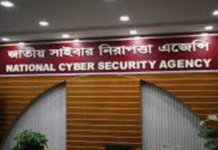Law minister Anisul Huq on Thursday said the government was scrutinising scopes to overturn the Supreme Court verdict scarping parliamentary authority to impeach higher judiciary judges.
‘We are aggrieved by this verdict and are certainly considering whether to file a plea to review the apex court judgement. We are yet to make decision on this as we are scrutinising each and every details of this judgment precisely,’ he told a crowded press conference at his office.
He said the apex court verdict was ‘unacceptable’ as it was not ‘driven by logic but rather by emotion animosity’ while ‘the accountability of judiciary must be reposed with the people and none can take this away’. The minister said the government would pursue the issue through legal means as ‘we do not have any intention of tackling this politically’.
Huq’s comments came amid a visibly growing row between parliament and the Supreme Court over its July 3 verdict declaring void the 16th constitutional amendment in 2014.
‘I would like to tell you very humbly that the logic showed by the Appellate Division in scraping 16th amendment to the constitution, are not acceptable to us… Honorable chief justice in his judgement said many irrelevant things, which in no way have any relevance with the fact in issue of this case,’ he said.
Huq added: ‘The chief justice made slanderous comments about the Jatiya Sangsad and belittled the institution.’
The minister said initiatives would also be taken to get expunged the chief justice’s comments ‘which we have found objectionable and irrelevant in our observation’.
Huq said prime minister Sheikh Hasina’s incumbent government drew an end to the culture of impunity and freed the country from anarchy.
‘Therefore when the judgment says we have curbed the independence of judiciary by the 16th amendment, we only can feel aggrieved,’ he added.
Asked for comments about main opposition outside parliament BNP’s call for forming public opinion in support of the judgment, Huq said such stance does not befit them.
‘Those who do not comply with court’s order, do not respect judges…should not talk about rule of law as this doesn’t suit them,’ he said.
Law secretary Abu Saleh Sk Md Zahirul Haque and other senior officials of the ministry were present at the briefing.
Source: New Age










On page 226 of the verdict Honourable Judges stated, “After independence, those unholy alliances of power-mongers twice reduced this country to a banana Republic, where people are seen as commodity which can be bluffed and compromised at any unworthy cost to legalize their illegitimate exercise of power.” Hardly anyone doubts that two martial laws (1975 by Mushtaq Ahmed and 1982 by Ershad) are referred by this statement. Certainly Ershad tried his best to legalize his illegitimate exercise of power http://www.nytimes.com/1990/12/09/world/revolution-brings-bangladesh-hope.html
People, who think that one was directed to Ziaur Rahman regime, must take the following facts into consideration:
1. Ziaur Rahman never proclaimed martial law, he only inherited it on 7 November 1975;
2. Rather Ziaur Rahman was the one who eventually withdrew the existing martial law;
3. Ziaur Rahman asked for people’s verdict through ‘yes’ – ‘no’ vote and then later came to power through general election in 1978. Was this legalizing his illegitimate exercise of power?
4. Possibly not. This was evident from people’s reaction on his killing on 30 May 1981 and the number of people attending Ziaur Rahman’s Janaza https://www.youtube.com/watch?v=4l3u02ZScc8
5. If Ziaur Rahman was unpopular to the people of Bangladesh, why his party BNP (Justice Sattar) was elected by people in 1981 election and after Ershad’s fall 1991 election which was held under the most acceptable caretaker authority?